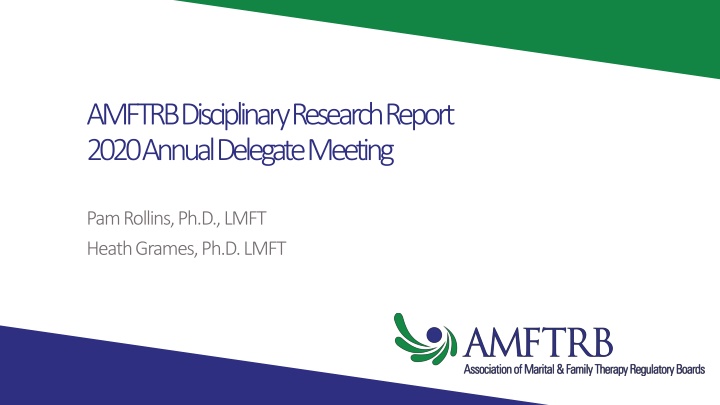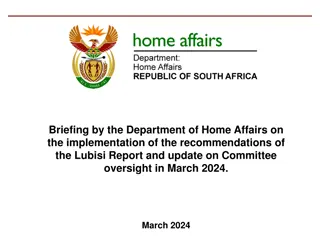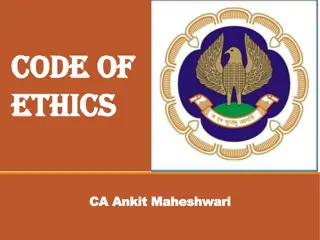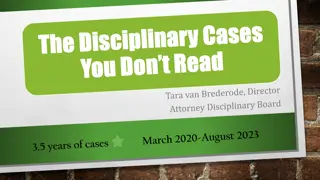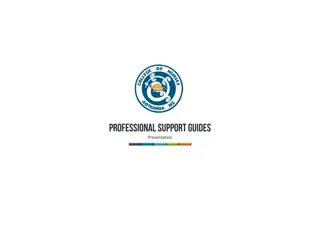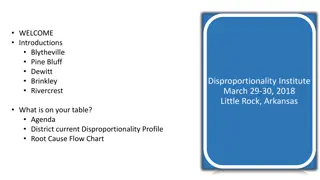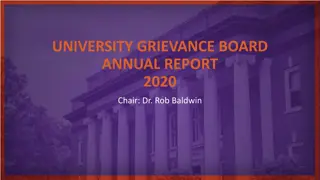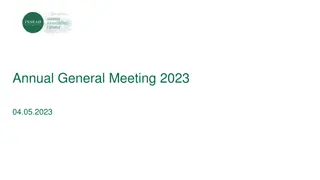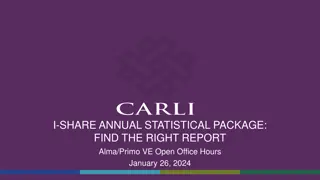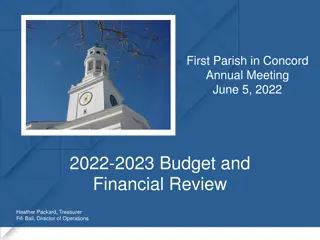AMFTRB Disciplinary Research Report 2020 Annual Delegate Meeting
This research report analyzes disciplinary data on violations and sanctions in the field of marriage and family therapy from 2008-2018. The study examines the methodology, participating states, common violations with sanctions, and highlights patterns in disciplinary actions. With a focus on cases from California and other states, the report provides valuable insights into professional conduct and regulation within the industry.
Download Presentation

Please find below an Image/Link to download the presentation.
The content on the website is provided AS IS for your information and personal use only. It may not be sold, licensed, or shared on other websites without obtaining consent from the author.If you encounter any issues during the download, it is possible that the publisher has removed the file from their server.
You are allowed to download the files provided on this website for personal or commercial use, subject to the condition that they are used lawfully. All files are the property of their respective owners.
The content on the website is provided AS IS for your information and personal use only. It may not be sold, licensed, or shared on other websites without obtaining consent from the author.
E N D
Presentation Transcript
AMFTRB Disciplinary Research Report 2020 Annual Delegate Meeting Pam Rollins, Ph.D., LMFT Heath Grames, Ph.D. LMFT
Methodology for Violations/Sanctions Project Data source: disciplinary information posted publicly on state licensure board websites or through open records requests for the years 2008-2018 Terminology among states differed; researchers engaged in comparison to standardize and monitored data collection for accuracy of coding. The final sample consisted of 1,241 cases from 36 states resulting in 2,609 violations and 4,700 sanctions Note: 71.6% of the cases are from one state California 889 cases 2069 violations; 3972 sanctions Other 35 352 cases 540 violations; 728 sanctions Due to high number of cases from one state, data were divided into CA and the remaining 35 states
Participating States # of Violations # of Violations # of Violations State # of Violations State State State Alabama 7 Kansas 20 New York 2 West Virginia 0 Arizona 18 Kentucky 8 North Dakota 2 Wisconsin 8 California 889 Louisiana 6 Ohio 2 Wyoming 3 Colorado 32 Maine 2 Oklahoma 5 Connecticut 6 Michigan 2 Oregon 20 Delaware 1 Minnesota 46 Pennsylvania 13 Hawaii 1 Mississippi 4 South Carolina 3 Idaho 22 Missouri 6 Tennessee 30 Illinois 3 Nevada 2 Texas 30 Indiana 12 New Hampshire 0 Utah 7 Iowa 3 New Jersey 14 Virginia 10
Most Common Violations w/Sanctions (w/o CA) Violation Sanction 1 Sanction 2 Sanction 3 Non-sexual dual relationships CEUs Probation Voluntary Relinquishment Failure to meet CEU requirements Fine CEUs Pay court costs Sexual misconduct/dual relationship Voluntary relinquishment Revoked Pay court costs Unlicensed practice/practicing w/ an expired license Fine Reprimand/Letter of Admonition Cease and Desist Misrepresentation on license paperwork CEUs Reprimand/Letter of Admonition Pay Court Costs Supervision Application denied
CA Most Common Violations w/Sanctions Violation Sanction 1 Sanction 2 Sanction 3 Sanction 4 Convicted/Arrested for a Misdemeanor Stayed revocation Pay court costs Inform employer, clients & referral sources Restricted from supervising Probation Impairment DUI or Substance Abuse Stayed revocation Pay court costs Inform employer, clients & referral sources Restricted from supervising Probation Unprofessional Conduct Stayed revocation Pay court costs Inform employer, clients & referral sources Probation Restricted from supervising Misrepresentation on license paperwork Fine and CEUs Statement of compliance Stayed revocation Pay court costs Failure to meet CEU requirements Fines and CEUs Statement of compliance
Most Common Complaints by Gender Males in CA committed or arrested for a misdemeanor unprofessional conduct impairment substance use Females in CA committed or arrested for a misdemeanor impairment substance use misrepresentation on licensure Males in all other states sexual dual relationship failure to meet CEU requirements non-sexual dual relationships Females in all other states unlicensed practice or practicing with an expired license failure to meet CEU requirements non-sexual dual relationship
License Type Type of Licenses Sanctioned 80% 70% LMFT 67% Provisional License 29.7% Applicant/Unlicensed 3.2% Temporary - .2% 60% 50% 40% 30% 20% 10% 0% Percentage LMFT Provisional Applicant Temporary
Number of Years Practicing When Complaint Made 400 350 300 250 200 150 100 50 0 0 yrs 0-1 yrs 2-5 yrs 6-10 yrs 11-20 yrs 21-30 yrs 31-40 yrs 41-50 yrs 51-60 yrs
Survey of Licensed MFTs Survey study sent via email to approximately 8,585 licensed MFTS through purchased email list and professional organizations utilizing a link to Qualtrics confidential survey; 503 responses; 5.9% response rate Final sample of 405 MFTs, of which 44 or 9.2% reported receiving a complaint
Demographics of Complaint Sample Ages ranged from 30 to 73 with a mean age of 55.52 (SD = 11.71). 56.8% female and 40.9% male. Majority were Caucasian (39; 88.6%) heterosexual (38; 86.3%), and married or partnered (30; 68.2%) No. of years licensed ranged from two to 37 with an average of 18.50 (SD = 10.31) 54.5% held only one license, followed by 36.4% who held a second license, and 9.1% who held three licenses 55% worked in a solo private practice, followed by 31.8% in a group private practice, 6% in an agency setting, 4.5% in a university setting, 4.5% in a hospital setting, and the remaining in various other practice settings.
Complainant Complaints filed by Client -61.4% Another mental health professional - 13.6% Relative of client - 11.4% Client s attorney - 4.5% Employer - 2.3% Former client - 2.3% Dept of Justice 1.8% 18.2% of clients involved had diagnosis of borderline personality disorder 27.8% of clients were participating in individual therapy; 20.5% in family therapy; 13.6% in couples therapy; 4.5% in group therapy; 2.3% in a forensic evaluation; 31.8% didn t respond
Survey, continued Most common complaints were unprofessional conduct (14; 31.8%), incompetence and breach of confidentiality (6; 13.6% respectively), dual relationships sexual and nonsexual (2; 4.5% respectively) Of the 44 complaints, 32 or 72.7% were dismissed (38.6% following investigation and 34.1% without investigation)
Complaint Outcomes Dismissed without investigation Dismissed without investigation Outcome 34.1% Dismissed following investigation Dismissed following investigation 38.6% Dismissed with a warning Dismissed with a warning 2.3% Consent agreement Consent agreement 6.8% Moved to hearing Moved to hearing 4.5% Pending/Unknown Pending/Unknown 9.1% Dismissed after investigation Dismissed no investigation Consent Agreement Dismissed w/warning Not disclosed Not disclosed 4.5% Pending Hearing
Significant Differences Between Groups Therapists who received a complaint reported having practiced an average 18.5 years compared with 13.82 years for those who did not receive a complaint Comparison 60 50 40 30 20 10 Therapists who received a complaint reported an average age of 55.52 years compared with 49.83 years for those who did not receive a complaint 0 Yrs Practice Age Received Complaint No Complaint Rollins, Holden, & Grames, 2020
